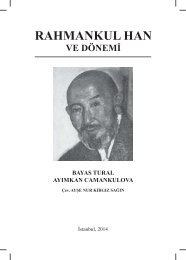THE SOVIET HISTORIOGRAPHY AND THE QUESTION OF KAZAKHSTAN’S HISTORY
SOVYET-TARIH-YAZICILIGI-ENG
SOVYET-TARIH-YAZICILIGI-ENG
Create successful ePaper yourself
Turn your PDF publications into a flip-book with our unique Google optimized e-Paper software.
<strong>THE</strong> <strong>QUESTION</strong> <strong>OF</strong> <strong>KAZAKHSTAN’S</strong> <strong>HISTORY</strong> 171<br />
the republic borders with the national languages, which is why the<br />
Russian language was the essential language. 304<br />
The historians faced the necessity of the Russian language for<br />
another subject. Historians preparing their thesis defense also required<br />
an acknowledgment of their academic title in the universities or<br />
science academies, had to send their thesis to a committee in Moscow<br />
for approval. And, for this approval, the thesis had to be written in<br />
Russian or translated into Russian.<br />
Another subject that brings the historian and the Russian language<br />
face to face is the terminology that changed after the October<br />
Revolution. Within the new historiography that emerged during the<br />
period following the October Revolution, some sentences, phrases<br />
and even words changed to be replaced by new terminology. Words<br />
such as dynasty and progeny were replaced with revolution, rebellion,<br />
Bolshevik, social struggle, proletarian, worker and peasant. “Evolution<br />
of the socialist revolution in villages”, “worker’s and peasant’s fight<br />
for freedom”, “the establishment of the socialist community” became<br />
popular and they were reflected in the history books. 305<br />
7. The publication of History and Censorship<br />
Historians often arrived at the point that after receiving approval<br />
by the university or the science academy to determine where the<br />
work must be published. What kind of problems faced the historian<br />
with the decision to publish the work?<br />
The biggest problem for the historian was censorship. To fully understand<br />
the struggle of the historian, the method and the procedures<br />
of the censorship in Soviet Union must be examined.<br />
Censorship in Soviet Union was overarching in every area; starting<br />
with scientific subjects, literature, paintings and even the labels on<br />
the bottles were subject to censorship. But, the interesting part of<br />
this is that censorship was discreet, even for the writers. There was<br />
304 The biggest struggle of the historians of Azerbeijan and Middle asia was the fact that<br />
they were unable get in touch with the Arabic Alphabet. Arabic was forbidden because it<br />
was the language of Quran, and this situation made the old resources unreachable. And<br />
most of the historions who knew the language was put in jail, egziled or killed during 1937s<br />
for being close to Turks or İslam.” See: Bünyadov, Ziya “Sicence of history in Azerbaijan on<br />
the Line Between Two Centuries: Situation and perspective”, Elm ve Hayat Magazine, Issue<br />
10, Baku 1988, p. 2; “Выступления А. Н. Нусупбековa”, Vsesoyuznoe Soveshanie o<br />
Merakh Uluchsheniya Podgotovki Nauchno-Pedagogicheskikh Kadrov po İstoricheskim<br />
Naukam (18-21 Dekabrya 1962 g.), Moscow 1964, p. 104.<br />
305 To look at the index of the books published during the Soviet Union would be enough for<br />
this. For detailed information look: Ağayev, ibid, pp. 260-275.



